|
|
|
Sort Order |
|
|
|
Items / Page
|
|
|
|
|
|
|
| Srl | Item |
| 1 |
ID:
124900
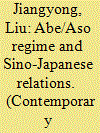

|
|
|
|
|
| Publication |
2013.
|
| Summary/Abstract |
The establishment of the "Abe/Aso regime" is one result of the rise of the Japanese right-wing forces. The Abe government has denied Japanese aggression history and tried to revise the Japanese Constitution in order to reconstruct powerful military forces. It has also used the Diaoyu Islands issue to serve its domestic and foreign policy objectives, causing a serious backslide in Sino-Japanese relations.
|
|
|
|
|
|
|
|
|
|
|
|
|
|
|
|
| 2 |
ID:
117609
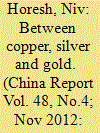

|
|
|
|
|
| Publication |
2012.
|
| Summary/Abstract |
This article provides the first comparative overview in English of Japanese colonial banks before World War II with an emphasis on their roles as banks of issue in Taiwan, Korea and Northeast China. It discusses at length similarities and differences in these banks' note circulation patterns, in their note-reserve requirements and their actual application, and in their geographical spread and respective colonial mandates. There was some variation in Japanese bank note issuance in the colonial setting of Korea and Taiwan, in 'Manchukuo' and in those parts of China that remained nominally sovereign. But all Japanese colonial banks seem, in one way or another, to have astutely adjusted the spread of their note issue in order to control for flagging demand due to nationalist boycotts, or to conversely cash in on demand spurts for notes resulting from crises in the indigenous financial sector. The banks of issue under review here were theoretically subject to a 100 per cent reserve requirement, but the make-up of their metallic bullion reserve and the degree of their notes' convertibility were very dissimilar, reflecting varying local conditions. Both in terms of reserve ratios, and note denominations-the banks prudently followed charter obligations that were devised by the Japanese Treasury but, at the same time, were reminiscent of the obligations that British overseas banks also had to abide by. Thus, the findings discussed here shed light on the inception and adaptability of Japanese colonial policy in the lead-up to the Pacific War.
|
|
|
|
|
|
|
|
|
|
|
|
|
|
|
|
| 3 |
ID:
138613
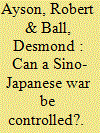

|
|
|
|
|
| Summary/Abstract |
It has been decades since the last war between major powers in Asia, but there is no guarantee that the region will always be able to avoid conflict. The greatest strain on the peace is in North Asia, where there has been rising tension between China and Japan. What begins as a
minor skirmish between China and Japan could conceivably escalate into a more serious conflict that involved the United States and, in the worst case, the use of nuclear weapons by Beijing and Washington. Even a major conventional conflict (between just Japan and China, or
involving all three) could be devastating for North Asia and the wider region, leading to a significant loss of life and widespread political, institutional and economic damage.
|
|
|
|
|
|
|
|
|
|
|
|
|
|
|
|
| 4 |
ID:
109479
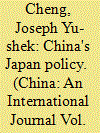

|
|
|
|
|
| Publication |
2011.
|
| Summary/Abstract |
Due to historical legacies in Sino-Japanese relations, including the absence of a satisfactory apology to the Chinese people for Japan's war atrocities, the related history textbook issue in Japan's secondary schools, the visits to the Yasukuni Shrine by Japanese political leaders and the territorial disputes over the Diaoyu/Senkaku Islands as well as the exclusive economic zones in the East Asia Sea, China's rising nationalism has been mainly directed at Japan, making it difficult for the Chinese leadership to engage in negotiations with its Japanese counterpart with respect to agreements on mutual concessions.
|
|
|
|
|
|
|
|
|
|
|
|
|
|
|
|
| 5 |
ID:
108066
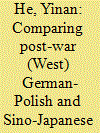

|
|
|
|
|
| Publication |
2011.
|
| Summary/Abstract |
The article argues that the harmonisation of national memories facilitates genuine reconciliation, while memory divergence resulting from national mythmaking hampers reconciliation. After World War II, Sino-Japanese and West German-Polish relations were antagonised by the Cold War structure, and pernicious myths prevailed in national collective memory. Then China and Japan brushed aside historical legacy for immediate diplomatic normalisation, but their reconciliation was impeded by elite mythmaking practices. Since the 1970s West Germany and Poland have de-mythified war history and engaged in historical settlement, paving the way for deep reconciliation after the Cold War.
|
|
|
|
|
|
|
|
|
|
|
|
|
|
|
|
| 6 |
ID:
106724
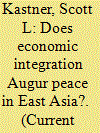

|
|
|
|
|
| Publication |
2011.
|
| Summary/Abstract |
At the end of the day, it is not clear that economic ties will act as a significant constraint on state behavior when high-stakes issues are on the table.
|
|
|
|
|
|
|
|
|
|
|
|
|
|
|
|
| 7 |
ID:
131392
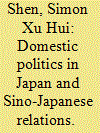

|
|
|
|
|
| Publication |
2014.
|
| Summary/Abstract |
The Sino-Japanese relations have again reached to the lowest point since Koizumi's rule. Contrary to the conventional literatures which explaining the dynamic relation from the international dimensions, this special issue highlights the different domestic actors in Japanese politics who contribute significantly to the foreign policy-making process, notably regarding Japan's Chinese policies. While there is a significant rightward shift in domestic politics and a growing discrepancy between central and local level politicians, the quest for discursive power between the opposing camps in the relevant areas will heavily determine future Sino-Japanese relationships.
|
|
|
|
|
|
|
|
|
|
|
|
|
|
|
|
| 8 |
ID:
084398
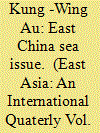

|
|
|
|
|
| Publication |
2008.
|
| Summary/Abstract |
Japan and China argued for oil and gas in the East China Sea. The issue flared up in 2003. Between 2004 and 2007 the two sides held 11 rounds of official talks in order to resolve the issue. They sought demarcation of the sea and joint development in the disputed area. The gap between positions remained wide. China claims its continental shelf; Japan proposes a median line. By closely monitoring different rounds of talks, remarks, developments, maneuvers, negotiators and dates, it is possible to construct a broad picture of the issue to measure progress and predict outcomes. It is found that improving relations not only facilitate negotiations but somehow exert pressure for a settlement. The general relationship did affect the pace of talks, which could produce a partial solution.
|
|
|
|
|
|
|
|
|
|
|
|
|
|
|
|
| 9 |
ID:
126358
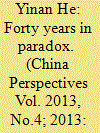

|
|
|
|
|
| Publication |
2013.
|
| Summary/Abstract |
Post-normalisation Sino-Japanese relations have been fraught with contradictions. In particular, three paradoxes stand out over the past 40 years. First, despite many shared geopolitical and economic interests, China and Japan have never developed genuine strategic cooperation, and since the 2000s have even evinced a trend towards thinly-veiled or open rivalry. Second, time, rather than healing the wounds of past wars, has since the mid-1980s yielded only a more vivid and bitter recollection of history that has bedevilled both official and popular relations. Third, diplomatic and commercial ties as well as "thick" societal contacts developed since normalisation have failed to bridge a significant gap in values. This article reviews Sino-Japanese relations since 1972, with a special focus on internal politics on both sides. It considers the influence of their conflicting historical narratives and political systems, and of the broader international geopolitical context, on the evolution of their delicate, paradoxical bilateral relationship. It concludes that a healthier bilateral relationship may depend on the development in both countries of a genuine, robust civil society that is relatively free from political interference.
|
|
|
|
|
|
|
|
|
|
|
|
|
|
|
|
| 10 |
ID:
130631


|
|
|
| 11 |
ID:
140410


|
|
|
|
|
| Summary/Abstract |
Despite frequent talk of conflict and even war, economic and strategic factors suggest that the Sino–Japanese dispute over the East China Sea will not erupt into hot conflict, at least for the time being. However, for domestic reasons, overt cooperation remains a distant prospect.
|
|
|
|
|
|
|
|
|
|
|
|
|
|
|
|
| 12 |
ID:
137144
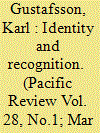

|
|
|
|
|
| Summary/Abstract |
In the 1990s, Japanese views of China were relatively positive. In the 2000s, however, views of China have deteriorated markedly and China has increasingly come to be seen as ‘anti-Japanese’. How can these developments, which took place despite increased economic interdependence, be understood? One seemingly obvious explanation is the occurrence of ‘anti-Japanese’ incidents in China since the mid-2000s. I suggest that these incidents per se do not fully explain the puzzle. Protests against other countries occasionally occur and may influence public opinion. Nonetheless, the interpretation of such events arguably determines their significance. Demonstrations may be seen as legitimate or spontaneous. If understood as denying recognition of an actor's self-identity, the causes of such incidents are likely to have considerably deeper and more severe consequences than what would otherwise be the case. Through an analysis of Japanese parliamentary debates and newspaper editorials, the paper demonstrates that the Chinese government has come to be seen as denying Japan's self-identity as a peaceful state that has provided China with substantial amounts of official development aid (ODA) during the post-war era. This is mainly because China teaches patriotic education, which is viewed as the root cause of ‘anti-Japanese’ incidents. China, then, is not regarded as ‘anti-Japanese’ merely because of protests against Japan and attacks on Japanese material interests but for denying a key component of Japan's self-image. Moreover, the analysis shows that explicit Chinese statements recognising Japan's self-identity have been highly praised in Japan. The article concludes that if China recognises Japan's self-understanding of its identity as peaceful, Japan is more likely to stick to this identity and act accordingly whereas Chinese denials of it might empower Japanese actors who seek to move away from this identity and ‘normalise’ Japan, for example, by revising the pacifist Article Nine of the Japanese constitution.
|
|
|
|
|
|
|
|
|
|
|
|
|
|
|
|
| 13 |
ID:
163374
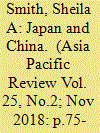

|
|
|
|
|
| Summary/Abstract |
No relationship is more important to the future of Asia than the one between Japan and China. PM Abe’s visit to Beijing last month put the relationship back on a firmer footing. Yet diplomacy alone will not stabilize Sino-Japanese relations. Popular attitudes in both countries also matter, and will be shaped by the success or failure of leaders to manage the growing complexity of this relationship from food security to fisheries management to national defense and new solutions to China’s growing influence over the daily lives of Japanese. Across Asia too, Japan and China will need to coexist without impeding each other’s influence. Next year’s visit to Japan by President Xi offers ample opportunity for expanding the foundation of this latest round of diplomatic “fresh starts” in the Japan-China relationship. Uncertainty over the US role in Asia, however, has made this a more difficult task.
|
|
|
|
|
|
|
|
|
|
|
|
|
|
|
|
| 14 |
ID:
092875
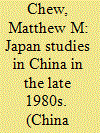

|
|
|
|
|
| Publication |
2009.
|
| Summary/Abstract |
This article adopts a sociology of knowledge perspective to analyze Japan studies scholarship published in China in the late 1980s. The objective of the analysis is to interpret the significant body of scholarship in terms of three of its sociopolitical implications. Firstly, the role of scholarship in its advocacy of Japan as a development model for China will be examined, thereby uncovering one of the multiple historical sources for the Chinese reform. Secondly, Japanese studies scholars, despite their being establishment intellectuals, made bold proposals in the late 1980s for economic, political, and social change. Thirdly, this article will document the Japan studies scholars' largely positive appraisal of Japan as well as their resistance of anti-Japanese sentiments in the Chinese state and society. Findings indicate that the scholarship deviated from the official line, critiqued the Chinese state, promoted radical reform proposals, positively evaluated Japan, and offered a Japanese model for China's reform.
|
|
|
|
|
|
|
|
|
|
|
|
|
|
|
|
| 15 |
ID:
115433
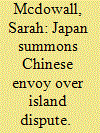

|
|
|
| 16 |
ID:
190658
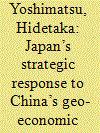

|
|
|
|
|
| Summary/Abstract |
In the new millennium, Japan found a renewed interest in infrastructure investment and engaged in this policy issue with diplomatic initiatives and external partnerships with due attention to China’s geo-economic presence. In formulating strategies for infrastructure investment, Japan has presented and disseminated a specific idea of ‘quality infrastructure’ as a principal component of its external infrastructure push. This article seeks to trace the evolution of Japan’s ideational principles for quality infrastructure and elucidate policy motivation, policy objective, and external influence. It argues that Japan’s advocacy of quality infrastructure derived from domestic impetus to expand infrastructure exports and external impetus to compete against China’s infrastructural push through the Belt and Road Initiative (BRI). Japan advocated quality infrastructure as a strategic tool to pursue multiple policy objectives that shifted from justifying Japanese infrastructural push to using as means to check and accommodate the BRI, and to legitimising common governance principles for infrastructure investment. In relations to external influence, Japan’s persistence in norm-setting encouraged China to incorporate normative principles first at business dialogues and then embed common governance principles in its policy approach to infrastructure investment.
|
|
|
|
|
|
|
|
|
|
|
|
|
|
|
|
| 17 |
ID:
113616
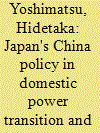

|
|
|
|
|
| Publication |
2012.
|
| Summary/Abstract |
The main objectives of this article are to examine the evolution of Japan's China policy in a power shift to the Democratic Party of Japan (DPJ) and to provide theoretical explanations for the evolution. The DPJ government showed accommodating postures toward China, and such postures derived from the DPJ leaders' particular preferences and perceptions as well as the party's aspiration for legitimating its power formation against the previous government. At the same time, political and security linkages with Washington constituted the baseline for Japan's evolving diplomatic intercourses with China. Neoclassical realism, which integrates domestic political factors with systemic political configurations, can provide valuable insights for explaining major aspects in the evolution of Japan's China policy.
|
|
|
|
|
|
|
|
|
|
|
|
|
|
|
|
| 18 |
ID:
156338
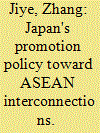

|
|
|
|
|
| Summary/Abstract |
In Japan's support for ASEAN countries connection building can be seen its policy visions in functional positioning, geographical layout and connotation constitution. As part of a systematic policy framework, Japan supports ASEAN transregional and outside-regional connection with the Mekong subregion as focal point, pushes forwardmetropolitan interconnection of ASEAN countries with Jakarta a priority,promotes building infrastructure, develops rules, and constructs better external environments for connectivity, all while advancing its partnership for quality infrastructure to attract ASEAN countries coopeation.Because of Japan's economic interests and geopolitical strategy toward ASEAN countries, Japan's policy influence China's belt and road initiative and China should properly respond to Japan's actions.
|
|
|
|
|
|
|
|
|
|
|
|
|
|
|
|
| 19 |
ID:
131395
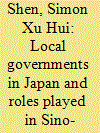

|
|
|
|
|
| Publication |
2014.
|
| Summary/Abstract |
The potential roles played by local governments in Japan regarding Sino-Japanese relations are often neglected. Drawing upon a few representative case studies by highlighting the interaction between local and international politics, the article aims at analyzing the possible impacts of Japan's local governments on Sino-Japanese relations in the future. First, it reviews the theoretical framework of sub-national or paradiplomacy and the relevant literature on Japan's local governments in such framework. Second, through showing how their local leaders attempted to pursue local or personal interests by taking Sino-Japanese relations as hostage, it uses four local governments in Japan that have peculiar interaction with China as case studies. Finally, it previews some patterns as derived from the cases, in order to draw some implications for both Tokyo and Beijing.
|
|
|
|
|
|
|
|
|
|
|
|
|
|
|
|
| 20 |
ID:
126212
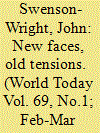

|
|
|
|
|
|
|
|